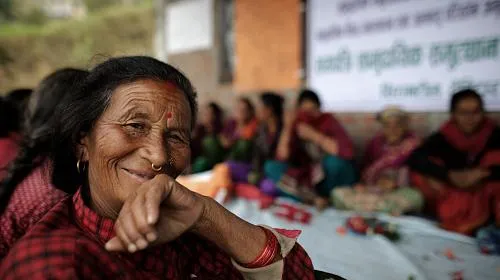WASHINGTON (April 28, 2017) – CARE today joins more than 100 organizations in the gender community to call on Congress to support a robust U.S. foreign assistance budget, particularly as it impacts women and girls around the world. Each year when Congress budgets and appropriates federal spending to provide for our common prosperity and security, it makes important decisions about American values and reflects those values to the nation and the world. Typically, this includes investing in the long-held and cherished American tradition of supporting vulnerable people at home and abroad, including the most marginalized, with the critical assistance they need to build healthy, self-sufficient lives. Increasingly, the U.S. has shown bold leadership in supporting women and girls to achieve their full potential, including those that make up 70 percent of the 1.3 billion people worldwide living in extreme poverty.
By spending roughly one percent of the budget, our foreign assistance dollars provide lifesaving assistance and transform lives and economies for the better across the globe. It is worth the penny on the dollar to support women entrepreneurs, business owners, and small shareholder farmers to become more self-reliant because doing so helps them lift themselves and their communities out of poverty. Including women in humanitarian and peacekeeping efforts not only brings their perspectives to the table, but also makes America’s noteworthy assistance in conflict and emergency settings more efficient and impactful. Preventing violence against women – which affects an estimated 35 percent of women worldwide – helps women be more secure, productive members of their societies and builds lasting peace both abroad and for Americans here at home. Foreign assistance is such a small sum, yet it means the difference between life or death for millions of women and girls globally.
For decades, foreign assistance has reflected and advanced American values globally. This strong bipartisan effort has helped people escape the cycle of poverty and oppression so they can lead secure and productive lives. Investments in women and girls bring high returns for economic growth, well-being, and democratic governance, which maximize the benefits gained from the investment of United States’ taxpayer dollars. In fact, research has shown that gender inequality is bad for economic growth. If women were able to participate in the economy equally, it would yield a 26 percent increase in global GDP, or $28 trillion in 2025. As history has shown, foreign assistance also helps America develop strong trade, political and military partners – for instance, 11 of America’s top 15 trading partners were once recipients of U.S. foreign aid.
In this work, the U.S. has been a model and beacon of hope to women and girls who survive violence, poverty, health threats and various forms of discrimination. Through the years, both Republican and Democratic administrations have invested in girls’ education, women’s health, economic opportunity, political participation, human rights, education and much more. For example, the U.S. President’s Emergency Plan for AIDS Relief (PEPFAR) started under the leadership of President George W. Bush has now reached tens of millions of people through life-saving medications and one million adolescent girls via critical HIV prevention interventions. These initiatives have become core to our foreign policy, our response to humanitarian emergencies, and our efforts to fight poverty around the world. We have already seen that investments in women and girls makes U.S. aid more effective. Cuts to any part of the foreign assistance budget will necessarily mean cuts to critical programs for women and girls, and for many such cuts could be life-threatening.
The U.S. Department of State and U.S. Agency for International Development (USAID) — including through the leadership of an Ambassador for Global Women’s Issues at State and a Senior Coordinator for Gender Equality and Women’s Empowerment at USAID — have been strong partners in advancing the bipartisan goal of empowering women and girls. Increasingly, agencies like MCC, Peace Corps, Labor and Agriculture, have also joined in this effort. Together, their efforts have made the United States a global powerhouse in leading the advancement of women and girls worldwide. Yet this work could be lost if it is not prioritized with appropriations and political commitment.
This appropriations cycle, CARE calls on Congress to remember the millions of women and girls who are counting on our policymakers to continue the proud, bipartisan and noble tradition of American goodwill and global leadership; leadership that they too often fail to see in their own countries. Congress must maintain funding for the foreign assistance budget at robust levels, including international development and humanitarian assistance, to provide lifesaving and impactful support for girls and women globally.
About CARE:
Founded in 1945, CARE is a leading humanitarian organization fighting global poverty. CARE places special focus on working alongside poor girls and women because, equipped with the proper resources, they have the power to lift whole families and entire communities out of poverty. Last year, CARE worked in 94 countries and reached more than 80 million people around the world. To learn more, please visit www.care.org.
Media Contact:
Nicole Ellis, +1-202-595-2828, nicole.ellis@care.org

